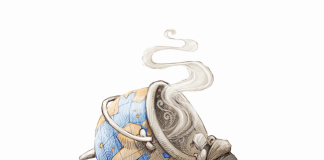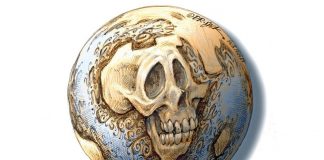Considering the impacts of habitat loss, electrocutions, collisions with man-made structures and direct or indirect poisoning, the harvesting of vultures for traditional medicine has become a serious threat to the continued survival of this species.
Traditional medicine as main cause
Many African cultures believe that health, disease, success or misfortune are not chance events, but are the result of the active influence of individuals or ancestral spirits. For this reason, traditional medicine is held in high esteem. A bout 26 million South Africans use traditional medicine as it is considered more appropriate, and because pharmaceutical drugs are too expensive. The demand for traditional medicine is higher than ever due to rapid urbanisation, the HIV pandemic and high levels of unemployment.
Because the trade in animal parts is secretive and mostly illegal, it is difficult to get reliable information on the species and number of vultures sold. Recent research shows that vultures are used in traditional medicine for a range of purposes and are believed to be most effective for providing clairvoyant powers, foresight and increased intelligence. The main uses of vulture medicine include gambling, business success and intelligence in school children.
Vulture parts are also prescribed by traditional healers for various ailments, including headaches. With an estimated 1 250 vulture traders, up to 160 vultures are sold per year in eastern South Africa, providing for some 59 000 consumption events of vulture pieces. Annual vulture sales amount to R1,2 million. The birds are harvested by hunters from a range of formally protected and unprotected natural areas in KZN, the Eastern Cape, Lesotho and southern Mozambique. They are killed using shotguns, poisons or traps. Poisoning is the most destructive method as numerous vultures are killed in one poisoning event. People who consume these poisoned vulture parts also risk secondary poisoning.
Facing vulture extinction
With small vulture populations and poor breeding success, the current vulture trade is not sustainable at current harvesting levels. will cause vulture trading to disintegrate in 15 to 30 years’ time. The white-backed vulture population in Zululand, which is the last stronghold of vultures in eastern South Africa, could become locally extinct in 26 years. The white-headed and lappet-faced vultures, still found in small populations in Zululand, are likely to disappear in five to 10 years, unless there is a dramatic change in management efforts.
Given harvesting levels, the Cape vulture populations in the Eastern Cape, KZN and Lesotho could become locally extinct within 50 years. If the number of white-backed vultures declines further, traders will be forced to harvest more Cape vultures. When that happens, Cape vultures in Lesotho, KZN and the Eastern Cape could be exhausted within 12 years. As it is, the endemic Cape vulture has declined by nearly 70% in the last 15 years in eastern while bearded vultures have dwindled from an estimated 200 breeding pairs to 100. Of the seven species of vultures in KZN, the bearded vulture is already locally extinct.
After the vultures are gone
The loss of vultures will not only result in a loss of culture and traditional belief systems, but also in direct economic losses. For example, the vulture hide at Giant’s Castle in the uKhahlamba Drakensberg Park World Heritage Site, which attracts many visitors from around the globe, generates R250 000 a year. This directly contributes to job creation and the local economy; neighbouring communities also benefit from a community levy paid by the visitors. Creating a vulture-friendly environment o protect such a cultural heritage, traditional knowledge and use, genetic resources, ecosystem functioning and economic benefits associated with vultures, harvesting must be reduced. he Endangered Wildlife Trust, Ezemvelo KZN Wildlife and other conservation organisations across the country would like to interact and discuss this issue with role-players in all sectors of the market and public health sector in an attempt to find effective and mutually acceptable solutions to this problem. Contact Steve McKean, resource use ecologist at Ezemvelo KZN Wildlife, on (033) 239 1512 or e-mail [email protected].













